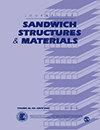A novel integrated forming strategy based on chemical vapor infiltration for C/C honeycomb with variable stiffness
IF 2.8
3区 材料科学
Q1 ENGINEERING, MECHANICAL
引用次数: 0
Abstract
Variable stiffness Carbon/Carbon (C/C) honeycomb can be designed to exhibit varying stiffness based on the structural load gradient, facilitating a high degree of alignment between structural performance and function. The elimination of mass redundancy and achievement of extreme light-weighting confer promising applications in the aerospace sector. However, the universal preparation approach for variable stiffness honeycomb faces challenges related to material mass redundancy and susceptibility to cracking at the bonds. Consequently, addressing the integrated forming issues associated with variable stiffness honeycomb becomes urgent. In this study, firstly, the conventional honeycomb densification method and the CVI domain-limited reactor design approach for integrated forming of variable-stiffness honeycombs are discussed. Subsequently, a multi-physics field coupling model for C/C honeycomb forming is developed, and its accuracy is validated through honeycomb forming experiments. The influence of three key process parameters, gas residence time, temperature, and pressure, on the quality of honeycomb forming were explored. Following the influence laws, the study applies specific process parameters to the three distinct regions of the reactor. Through this meticulously regulated process, the final variable stiffness honeycomb attains a 17.6 % reduction in weight compared to a constant density honeycomb of the same volume.基于化学气相渗透的新型集成成型策略,用于具有可变刚度的 C/C 蜂窝材料
可变刚度碳/碳(C/C)蜂窝可根据结构载荷梯度设计成不同的刚度,使结构性能和功能高度一致。消除质量冗余和实现极轻量化使其在航空航天领域的应用前景广阔。然而,变刚度蜂窝材料的通用制备方法面临着材料质量冗余和结合处易开裂的挑战。因此,解决与变刚度蜂窝材料相关的综合成型问题变得刻不容缓。在本研究中,首先讨论了用于变刚度蜂窝综合成型的传统蜂窝致密化方法和 CVI 限域反应器设计方法。随后,建立了 C/C 蜂窝成形的多物理场耦合模型,并通过蜂窝成形实验验证了该模型的准确性。研究探讨了气体停留时间、温度和压力这三个关键工艺参数对蜂窝成型质量的影响。根据影响规律,研究将特定的工艺参数应用于反应器的三个不同区域。通过这种精心调节的工艺,最终的可变刚度蜂窝与相同体积的恒定密度蜂窝相比,重量减轻了 17.6%。
本文章由计算机程序翻译,如有差异,请以英文原文为准。
求助全文
约1分钟内获得全文
求助全文
来源期刊

Journal of Sandwich Structures & Materials
工程技术-材料科学:表征与测试
CiteScore
9.60
自引率
2.60%
发文量
49
审稿时长
7 months
期刊介绍:
The Journal of Sandwich Structures and Materials is an international peer reviewed journal that provides a means of communication to fellow engineers and scientists by providing an archival record of developments in the science, technology, and professional practices of sandwich construction throughout the world. This journal is a member of the Committee on Publication Ethics (COPE).
 求助内容:
求助内容: 应助结果提醒方式:
应助结果提醒方式:


